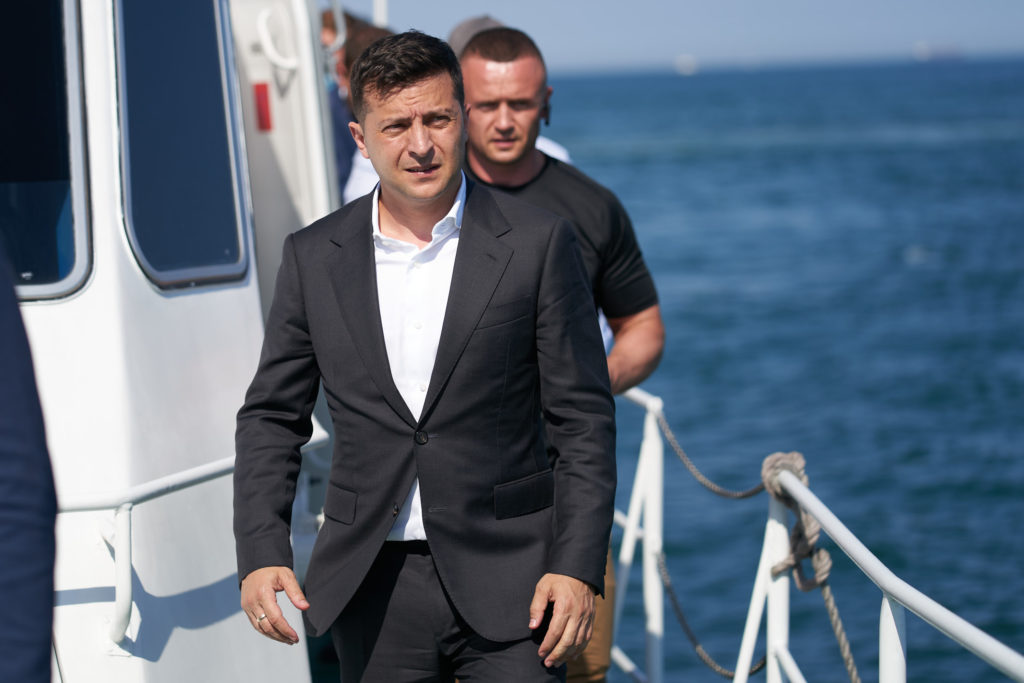The anniversary by the allies over the Nazis might have been a cause for celebration even among estranged former Soviet republics as Russia and Ukraine.
Instead, it was another day of ramping-up tensions, as Moscow, according to Kyiv, is menacing NATO ships in the Black Sea due for a long-planned port call in the iconic city of Odessa on 10 May.
Port calls by foreign vessels in Black Sea ports are nothing new. But Kyiv said the behaviour by Russian naval vessels was unprecedented. The Ukrainian border authorities reported that a U.S. Coast Guard vessel – the USCGC Hamilton, was greeted by Russian naval ships more than 100 km off the coast of Ukraine in that country’s EEZ (Exclusive Economic Zone) with intimidation.
“The Russian ships conducted dangerous manoeuvres nearby and deliberately created obstacles,” the Ukrainian government border service said, adding the incident occurred on May 8.
The visit by the U.S. ship, Ukraine said, was a planned, routine joint naval exercise.
“Our American partners came to Ukraine as part of a friendly visit in the framework of joint sea exercises, training in mutual experience and commando operations, as well as standard meetings of the representatives for mutual sea defences and the safety of ships of the two countries,” the service continued.
“Our partners were constantly monitored and accompanied by Russian ships.” It said that the Russian ships had citied that Moscow said the U.S. vessels were allegedly in some sort of “closed zones” for Ukrainian and U.S. vessels, and that the Russian ships failed to respond to standard requests using sea communications for international sea safety. “These extreme violations of the Russian vessels of international naval law have been carefully documented by Ukrainian border officials,” it said.
There was no immediate comment from the Kremlin on any of its traditional official information outlets.
The incident comes just days after U.S. Secretary of State Anthony Blinken visited Kyiv, offering unspecified additional military support.
All of this comes as the Kremlin formally announced it was pulling back some the 100,000-150,000 troops it had massed along the Ukraine border to “regular positions” – though in practice this means little, as many of these units are constantly stationed near the frontier with Ukraine anyway.
Many of those troops, in what the Kremlin has said were “regular exercises” – were dispatched to Crimea, annexed by Moscow in 2014 in a fit of anger that its pro-Russian President in Ukraine, Victor Yanukovich, had been driven from power in a bloody uprising. He is in hiding in Russia.
LARGER BLACK SEA MILITARY ISSUES
The heating of tensions comes at NATO ramps up major exercises in the Black Sea itself as well as along is coastal areas.
Earlier this month, NATO members and allies, with Black Sea coast member Romania as a base, began the “Dacia-21” exercises, with live-fire excercises at more than a dozen land bases in the country.
The drills will continue until mid-June, and include Albania, Bulgaria, Britain, Hungary, Germany, Spain, Italy, Latvia, Moldova, the Netherlands, Poland, Portugal, Slovakia, Turkey, France, Montenegro, and the United States.
And starting on May 20, NATO plans exercises called “Steadfast Defender 21”, which will take place in Romania, Hungary, Bulgaria and Portugal.
The Atlantic alliance says nine thousand troops will take part, as well as up to 20 ships and submarines – as well as 40 military aircraft. The three-stage exercises will also involve an additional 3,000 troops in Hungary, and later 4,000 more troops and 6,000 pieces of military hardware. The last stages of the manoeuvres will be aimed at practicing the transfer of military formations from the west to the south-eastern parts of NATO countries – apparently to show quick mobility.
Romanian Foreign Minister Bogdan Aurescu stirred futher interest by calling the Black Sea partly a “NATO lake” during an online discussion organized by the European Policy Center research organization, remark clearly intended to check any Russian attempts to turn the sea into an exclusive Russian zone of influence.
WATER TO CRIMEA BECOMING MATTER OF MILITARY SPECULATION
Russia has said the peninsula is enduring a water crisis of Ukrainian making as a canal which used to supply the area was closed after its 2014 Kremlin annexation.
Ukrainian officials deny this, saying there is no way they can be expected to supply water to annexed territory and that the “water crisis” is a Moscow invention to potentially justify military action.
Political analyst Iryna Nazarchuk, based in Odessa, said the issue was a canard.
“Any geologist can tell you that if needed, Moscow could easily provide Crimea with water by simple and established ways of well-drilling. Either that, or if they really wanted, they could even construct desalinisation plants, like many countries,” she said. She added that much drinking water was being diverted as “industrial water” for military or industrial facilities.
Some Russian officials have gone so far as to accuse Kyiv of an attempted “genocide” regarding the water issue in occupied Crimea.
Nazarchuk added that behind the scenes, Moscow has attempted to blackmail Kyiv by saying it should open the water canal, which is already in poor condition, to Crimea, and that some Ukrainian politicians have actually contemplated accepting the ultimatum.

